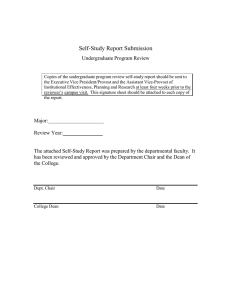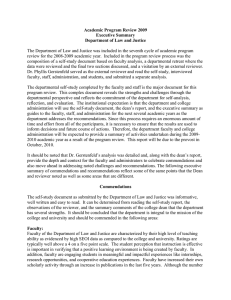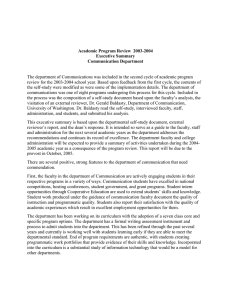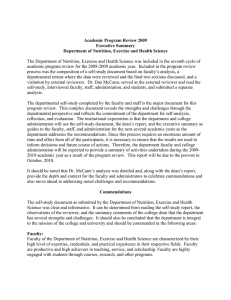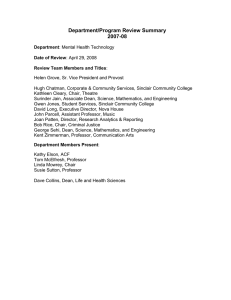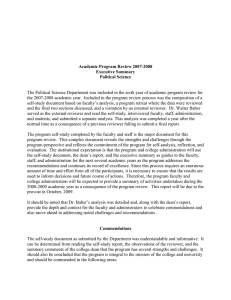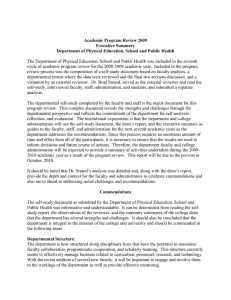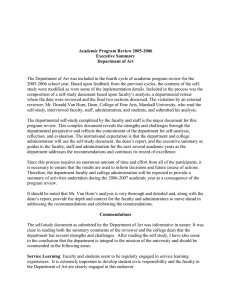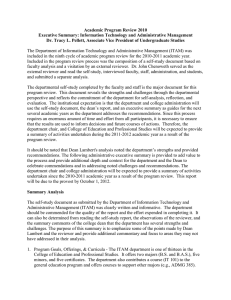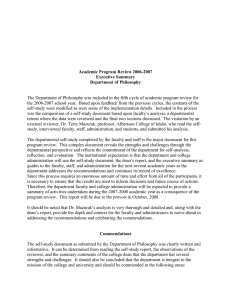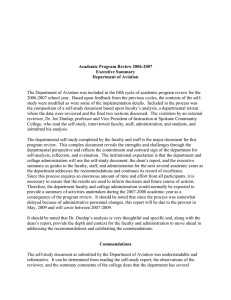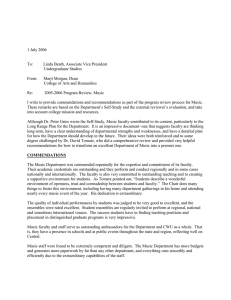The Department of History was included in the seventh cycle... the 2008-2009 academic year. Included in the program review... Academic Program Review 2009
advertisement
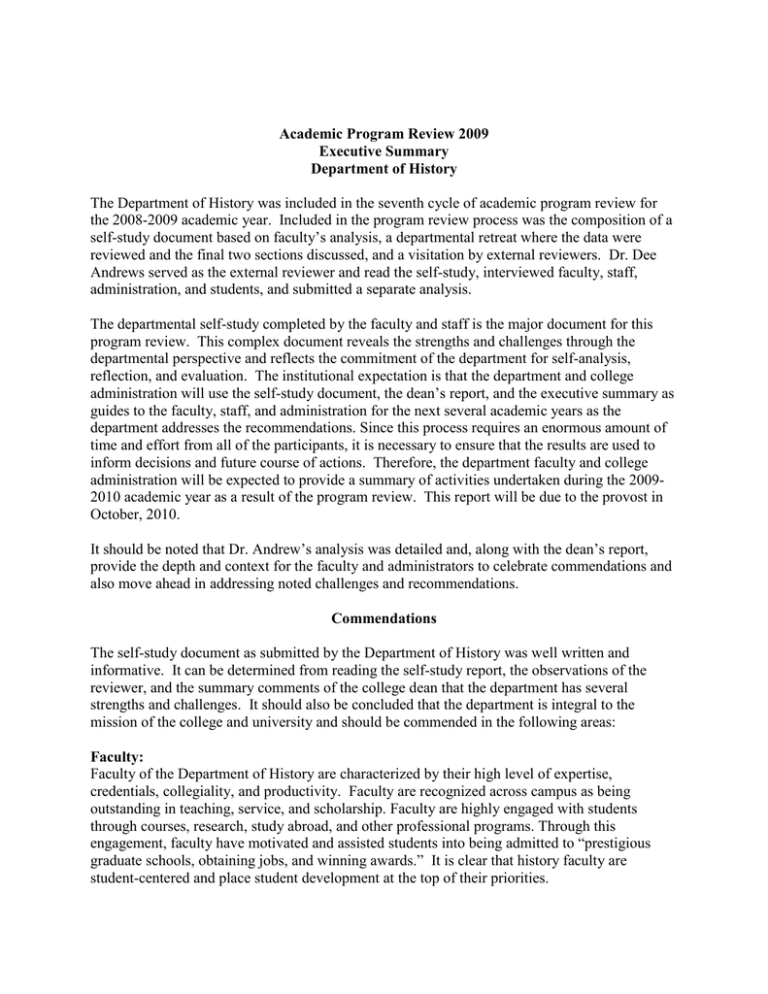
Academic Program Review 2009 Executive Summary Department of History The Department of History was included in the seventh cycle of academic program review for the 2008-2009 academic year. Included in the program review process was the composition of a self-study document based on faculty’s analysis, a departmental retreat where the data were reviewed and the final two sections discussed, and a visitation by external reviewers. Dr. Dee Andrews served as the external reviewer and read the self-study, interviewed faculty, staff, administration, and students, and submitted a separate analysis. The departmental self-study completed by the faculty and staff is the major document for this program review. This complex document reveals the strengths and challenges through the departmental perspective and reflects the commitment of the department for self-analysis, reflection, and evaluation. The institutional expectation is that the department and college administration will use the self-study document, the dean’s report, and the executive summary as guides to the faculty, staff, and administration for the next several academic years as the department addresses the recommendations. Since this process requires an enormous amount of time and effort from all of the participants, it is necessary to ensure that the results are used to inform decisions and future course of actions. Therefore, the department faculty and college administration will be expected to provide a summary of activities undertaken during the 20092010 academic year as a result of the program review. This report will be due to the provost in October, 2010. It should be noted that Dr. Andrew’s analysis was detailed and, along with the dean’s report, provide the depth and context for the faculty and administrators to celebrate commendations and also move ahead in addressing noted challenges and recommendations. Commendations The self-study document as submitted by the Department of History was well written and informative. It can be determined from reading the self-study report, the observations of the reviewer, and the summary comments of the college dean that the department has several strengths and challenges. It should also be concluded that the department is integral to the mission of the college and university and should be commended in the following areas: Faculty: Faculty of the Department of History are characterized by their high level of expertise, credentials, collegiality, and productivity. Faculty are recognized across campus as being outstanding in teaching, service, and scholarship. Faculty are highly engaged with students through courses, research, study abroad, and other professional programs. Through this engagement, faculty have motivated and assisted students into being admitted to “prestigious graduate schools, obtaining jobs, and winning awards.” It is clear that history faculty are student-centered and place student development at the top of their priorities. Assessment: All programs have made progress in their development of assessment plans, methods, and processes. Although programs need to improve in some areas of process and yearly reporting, all programs now seem committed to following an appropriate assessment regimen. Curriculum: The curriculum coverage and offerings are wide for the number of faculty in the department. Programs seem to be well subscribed as far as enrollment, although the large plan outpaces the small plan 2:1. Students report satisfaction with the courses and there seems to be general consensus from the reviewer and Dean that the curriculum is adequately preparing students to be successful at program exit. Recommendations Although the department should be commended in areas, there are also areas for improvement. Following are areas that should be addressed to improve the functioning and quality of the department and its associated programs: Assessment: Although noted as a commendation, the department needs to put continued energy and focus in examining student learning and other department goal-related data. Specifically, the department may want to consider assessing student attitudes (i.e., dispositions/attitudes necessary to be successful in the profession). Specific dispositions (e.g., collegiality, self-efficacy, ethics, professionalism, and others) may be important in being an effective history graduate and should probably be overtly addressed and assessed in its programs. In addition, student learning data should be compared to established standards of mastery and be disseminated and discussed with various stakeholders (students, alumni, faculty, administrators, advisory groups) to gather feedback for possible action. Requests for resources (including equipment and faculty lines) should be driven by the types of data that could be collected through a systematic and ongoing assessment system for the department (that extends beyond student learning data). Although mention is made of the potential addition of new fields to the department, it is somewhat unclear as to what data was collected or planning mechanism was in place to move in this direction. Assessment information can be helpful in gauging student interest and demand, employer need and demand as well as employment opportunities. This data can go far in realizing a positive result to requests. The department is encouraged to seek out available assistance in the college (Dean’s Office) and through the Office of Undergraduate Studies for assessment guidance. Curriculum: Based on reviewer and Dean comments, it seems that the department needs to review the viability of both a small and large plan in the history major, particularly since the credit hour differences are slight. The addition of upper division general education courses should be considered as it could have benefits for the history department in terms of expanded FTE and increased collaboration with Bachelor of Applied Science major programs. The department is encouraged to develop an advisory committee made up of various constituencies to obtain greater guidance with regard to curriculum and other programmatic matters. This can be by combining internal and external constituents (student representatives, alumni, etc.). The benefits of utilizing such a committee is manifold (i.e., employer panels) and worth the time and effort of establishing. Summary Overall, the Department of History is an important part of Central Washington University. Faculty are productive and effective in terms of student learning and success. By examining its curriculum and improving its assessment processes, the department has great potential in achieving its goals and those of the college, and university.
